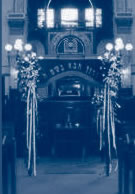|
SEDRA : Vayigash : Hertz Chumash p. 169
Genesis Chap. 44 v. 18
This week's Sedra is generously sponsored by Neville Sackville.
SYNOPSIS:
Judah approached Joseph and made a moving and eloquent appeal.
He begged that Benjamin be returned to his aged father who
had already lost one son and would die of grief if yet another
were taken from him whose soul was as dear to him as his very
own. Judah offered himself as a bondsman in Benjamin's place
as it was he who had personally guaranteed Benjamin's live
return. Joseph could no longer restrain himself, and, ordering
all others to withdraw, he emotionally and tearfully disclosed
his real identity. The brothers were speechless with fright
but Joseph told them not to reproach themselves for selling
him to Egypt as it had been G-d's will that he save his family
and the rest of the people from starvation. He urged them
to return to Canaan and hasten back with their father, their
families, flocks and herds. They would live in the land of
Goshen (the finest pastureland in Egypt) and have sufficient
food for the remaining five years of famine. The brothers
were embraced by Joseph and all wept with emotion. When the
news reached Pharaoh, he too invited them to settle in Egypt
and ordered that wagons be sent to convey Jacob and his household.
Joseph showered his brothers with gifts, for them and his
father, and they returned to Canaan.
When Jacob was told that Joseph was still alive, his heart
skipped a beat as he could not believe the news but, after
hearing the full story and seeing the wagons Joseph had sent,
he set forth on the journey accompanied by sixty-six(eventually
seventy) of his direct descendants and their families. He
stopped at Beersheba to offer sacrifices to G-d who appeared
in a vision and told him not to fear going to Egypt for his
descendants would return to Canaan.
On their arrival in Egypt Joseph went out to meet his father.
After an affectionate and emotional meeting, Joseph advised
his brothers to tell Pharaoh that they were herdsmen as the
Egyptians considered this to be an inferior occupation. Pharaoh
would therefore allow them to live apart in Goshen and they
would thus be able to preserve their separate identity. Joseph
presented five of his brothers to Pharaoh, who entrusted the
competent ones with the care of his own flocks. Joseph then
introduced his father, Jacob who bestowed his blessing on
Pharaoh.
The famine reached a critical stage and all the money of
the Egyptians and Canaanites had passed into the royal treasury.
In exchange for food, the Egyptians were now required first,
to hand over their cattle, and then to sell their lands. The
people were moved from the country to the cities where the
corn was stored, to facilitate its distribution. They were
still permitted, however, to cultivate their own lands providing
they paid one-fifth of the produce to Pharaoh. Land belonging
to the priests was exempted from this tax. So the Israelites
lived in the land of Goshen and acquired wealth and prosperity.
HAPHTORAH: Ezekiel Chapter 37 Verses 15-28 HERTZ CHUMASH
P. 178
The sedra recounts the reunification of Jacob's family after
the rift between Joseph and his brothers. Through Ezekiel,
G-d gives an assurance of the future of unity of the Israelites
following the division of the nation into a Northern Kingdom
of ten tribes and Judea.
TELL ME RABBI.....BIRKAT HAMMAZON - GRACE AFTER MEALS
The definition of a "meal" implies the consumption
of bread. The Talmud tells us of Abraham: "After the
travellers ate and drank, they rose to bless him (Abraham)
for it: but he said to them, 'Did you eat of mine? You ate
of that which belongs to the Lord of the Universe. Thank,
praise and bless Him who spoke and the world came into being'."
In the Torah we are enjoined:"And thou shalt eat and
be satisfied, and bless the Lord thy G-d". (Deut 8.10)
Our sages therefore said "Whoever enjoys any worldly
pleasure without offering a benediction is guilty of theft
from G-d".
Originally the Birkat Hammazon consisted of three parts.
Subsequently a fourth was added. The first three sections
are:
(1) "Benediction for food", which concludes with
the words "Hazan et Hakol".
(2) "Benediction and thanksgiving for the land of Israel",
beginning with "Nodeh lecha" and ending with "Al
haeretz v'al hammazon".
(3) The prayer for Jerusalem and the Sanctuary, beginning
with the word "Rachem". "Said R. Nahman: Moses
instituted the Birkat Hazan for Israel. At the time when manna
descended for them; Joshua instituted the Birkat Ha'Aretz,
the benediction for the land, when they entered Eretz Israel;
David and Solomon instituted the benediction which closes
with the words Boneh Yerushalaim, 'who buildest Jerusalem',
i.e. the third benediction; David instituted the words al
Yisrael amecha veal Yerushalaim irecha, "For Israel Thy
people and for Jerusalem Thy city'; Solomon instituted the
words al habayit haggadol vehakkadosh, "For the great
and holy house'." The permanent form however was compiled
by the Men of the Great Assembly.
The fourth benediction, hatov vehametiv, meaning, "who
is good and bestows goodness", was added later in memory
of those who were slain in Bethar, following the last stand
of Bar Cochba in 137 B.C.E. After Hadrian's prohibition against
burying the slain was relaxed, hatov vehammetiv: hatov, "Who
is good", was instituted because the bodies did not putrify;
vehammetiv, "Who bestows good", because they were
allowed to be buried.
One reason for our concluding the third section "rachem"
with the benediction, boneh berachamav Yerushalaim, Amen is
to indicate that what follows after, are later additions and
are not of biblical origin or prescribed by the Torah, but
are of Rabbinic origin.
The passages beginning with the words "harachaman","the
All Merciful" are of later origin and are all petitions
of a public or private nature. That we may be blessed - bakol
mikol kol - as our forefathers Abraham, Isaac and Jacob were
blessed, has its origin in the Talmud based upon the three
Biblical verses in which these blessings are mentioned.
On Sabbaths, Festivals and joyous occasions we sing the psalm
"Shir Hammaalot", to remember Zion even in our enjoyments
of earthly delights, before 'bentsching'.
The Talmud states: " On Shabbat and Festivals there is
a reference to the Shabbat or the Festival in the Grace after
Meals". On Shabbat we recite retze vehachalitzenu, expressing
the holiness and comfort which Shabbat gives; on festivals
and Rosh Chodesh, Yaale veyavo, contains references to these
festive occasions. Special blessings are added for weddings,
Brit Milah celebrations, and in the house of mourners. Talmudic
etiquette requires that "the host breaks the bread, the
guest says the grace. The guest says grace so that he may
bless the host". When three or more adult men have eaten
together, the Grace is introduced with the invitation (zimmun)
to bless, whereupon the others respond their readiness to
thank G-d "of whose bounty they have partaken".
A condensed form of grace, Brachah Ach'ronah is recited after
a snack with no bread, eg. cake, fruit or wine. The Grace
concludes on a note of peace:- "The Lord will give strength
unto his people; the Lord will bless his people with peace."
"Shabbat Shalom" is generously sponsored by Rosetta
and Nathan Baron
BACK TO SHABBAT SHALOM
TABLE
|








